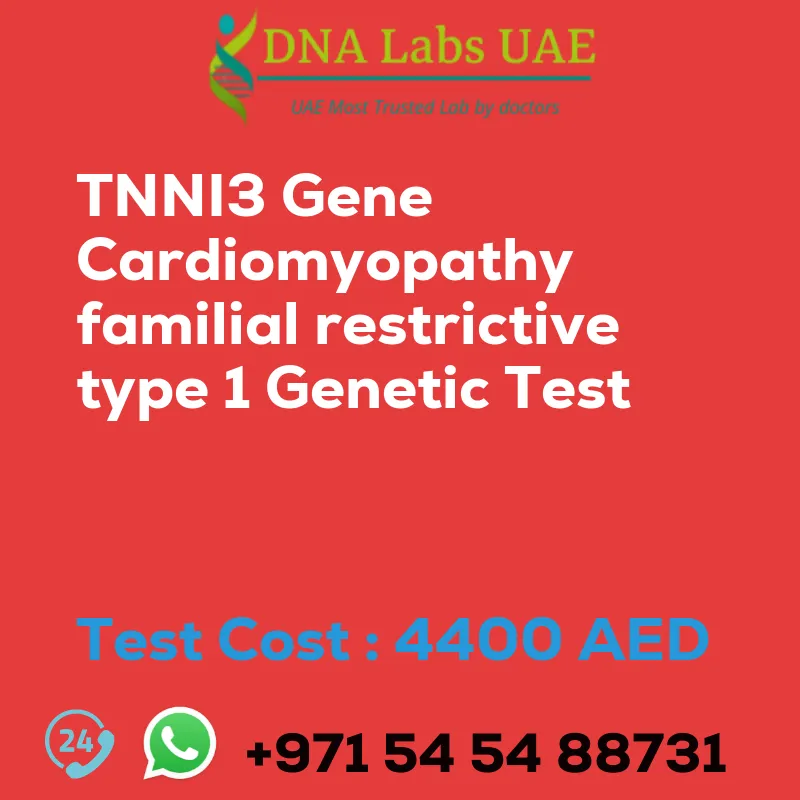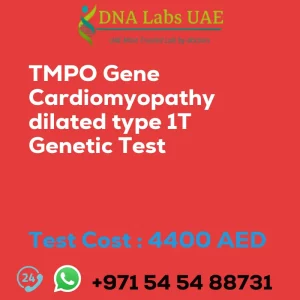TNNI3 Gene Cardiomyopathy Familial Restrictive Type 1 Genetic Test
Components: TNNI3 Gene Cardiomyopathy familial restrictive type 1 Genetic Test
Price: 4400.0 AED
Sample Condition: Blood or Extracted DNA or One drop Blood on FTA Card
Report Delivery: 3 to 4 Weeks
Method: NGS Technology
Test Type: Cardiovascular Pneumology Disorders
Doctor: Cardiologist
Test Department: Genetics
Pre Test Information: Clinical History of Patient who is going for TNNI3 Gene Cardiomyopathy, familial restrictive type 1 NGS Genetic DNA Test. A Genetic Counselling session to draw a pedigree chart of family members affected with TNNI3 Gene Cardiomyopathy, familial restrictive type 1 NGS Genetic DNA Test gene TNNI3
Test Details: TNNI3 gene cardiomyopathy, familial restrictive type 1 is a genetic disorder that affects the heart muscle. It is characterized by the development of restrictive cardiomyopathy, which is a condition where the heart muscle becomes stiff and cannot relax properly, leading to impaired filling of the heart chambers. The TNNI3 gene is responsible for providing instructions for the production of a protein called cardiac troponin I. This protein is involved in regulating the contraction and relaxation of the heart muscle. Mutations in the TNNI3 gene can disrupt the normal function of the protein, leading to the development of cardiomyopathy.
NGS (Next-Generation Sequencing) genetic testing is a method used to analyze a person’s DNA to identify any mutations or changes in the TNNI3 gene that may be associated with familial restrictive cardiomyopathy. This type of testing can provide valuable information for diagnosis, prognosis, and treatment planning for individuals and families affected by this genetic disorder.
Genetic testing for TNNI3 gene cardiomyopathy, familial restrictive type 1 can help identify individuals who are at risk of developing the condition, even before symptoms appear. It can also help determine the inheritance pattern of the disorder within a family and provide information for family planning.
It is important to note that genetic testing for TNNI3 gene cardiomyopathy, familial restrictive type 1 should be conducted by a qualified healthcare professional or genetic counselor, who can provide guidance on the implications of the test results and help individuals and families make informed decisions regarding their healthcare.
| Test Name | TNNI3 Gene Cardiomyopathy familial restrictive type 1 Genetic Test |
|---|---|
| Components | |
| Price | 4400.0 AED |
| Sample Condition | Blood or Extracted DNA or One drop Blood on FTA Card |
| Report Delivery | 3 to 4 Weeks |
| Method | NGS Technology |
| Test type | Cardiovascular Pneumology Disorders |
| Doctor | Cardiologist |
| Test Department: | Genetics |
| Pre Test Information | Clinical History of Patient who is going for TNNI3 Gene Cardiomyopathy, familial restrictive type 1 NGS Genetic DNA Test. A Genetic Counselling session to draw a pedigree chart of family members affected with TNNI3 Gene Cardiomyopathy, familial restrictive type 1 NGS Genetic DNA Test gene TNNI3 |
| Test Details |
TNNI3 gene cardiomyopathy, familial restrictive type 1 is a genetic disorder that affects the heart muscle. It is characterized by the development of restrictive cardiomyopathy, which is a condition where the heart muscle becomes stiff and cannot relax properly, leading to impaired filling of the heart chambers. The TNNI3 gene is responsible for providing instructions for the production of a protein called cardiac troponin I. This protein is involved in regulating the contraction and relaxation of the heart muscle. Mutations in the TNNI3 gene can disrupt the normal function of the protein, leading to the development of cardiomyopathy. NGS (Next-Generation Sequencing) genetic testing is a method used to analyze a person’s DNA to identify any mutations or changes in the TNNI3 gene that may be associated with familial restrictive cardiomyopathy. This type of testing can provide valuable information for diagnosis, prognosis, and treatment planning for individuals and families affected by this genetic disorder. Genetic testing for TNNI3 gene cardiomyopathy, familial restrictive type 1 can help identify individuals who are at risk of developing the condition, even before symptoms appear. It can also help determine the inheritance pattern of the disorder within a family and provide information for family planning. It is important to note that genetic testing for TNNI3 gene cardiomyopathy, familial restrictive type 1 should be conducted by a qualified healthcare professional or genetic counselor, who can provide guidance on the implications of the test results and help individuals and families make informed decisions regarding their healthcare. |








